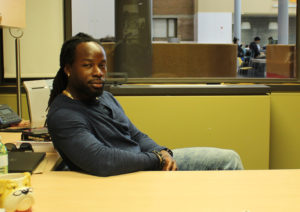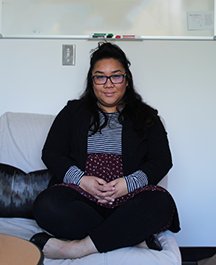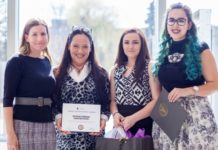
The experiences of professors of colour differ vastly from their white peers. For Christopher Taylor, a lecturer in the History department of UW, he has grown to be comfortable with his Blackness.
“It took years of continued growth, to be comfortable with who I am. Yeah, there are lots of barriers, there are lots of blocks, there were lots of things that challenged who I thought I was and who I’d like to be,” he said. “That has given me something; this resolve to be unapologetically Black. That I don’t need to be afraid of who I want to be.”
The way that professors relate to other faculty members and their students can change depending on their ethnicity. Kimberly Lopez, a Filipino professor in the department of Recreation and Leisure, stated that she heard many things from students that she didn’t expect, from parental expectations to relationship issues.
“I think faculty members are expected to put up boundaries between their students and themselves to protect time and stuff like that, and I think that’s important,” she said. “And, yeah, students of colour come to me and women knock on my door and tell me things that I don’t expect to hear in my job, but that’s kind of the load you have to navigate as a faculty member.”
Taylor shares a similar point of view. He stated that being able to support his students is an important part of his job, and he aims to validate them.
“I know how it is to have someone, whether it’s your prof or [someone else], you can see yourself with someone who’s on the other side of the desk, literally at the front of the room. And that goes a long way to validate your experiences as a human being, not just as a student, as a human being on these campuses,” he said. “If a student can come to me and be themselves, great. And I don’t care what colour they are.”

Lopez is the only professor of colour in her department, and Taylor is one of the few Black professors on campus. Both of them stated that representation is vital for students to be able to grow as academics and as people. Lopez stated that having all white faculties can pose barriers for students of colour.
“Having a faculty that’s full of white professors perpetuates that notion that this is not [a place for people of colour]—if I wanted to go to grad school—where would I end up? We can’t help but think those things,” she said.
Taylor stated that the stereotypes of Black males as criminals and athletes, as well as their absence in positive roles of power, can be detrimental for Black boys, but he is fortunate to have a family full of educators, in addition to the positive Barbadian culture of education.
“When I was in school the dropout rate was 40 per cent, for Black boys, 40 per cent… I’m an anomaly, I should not be where I am. A) I shouldn’t have graduated high school, B) I shouldn’t have gone to university, C) I shouldn’t have graduated from university, D) I shouldn’t have gotten a masters, E) I shouldn’t have gotten a PhD. So, I’m a unicorn,” he said. “We hear it all the time that Black people are uneducated and we don’t see Black doctors, we don’t see Black lawyers, we don’t see Black prime ministers, we don’t see Black politicians, I’m like ‘No!’ They exist”
Taylor drew inspiration from his immediate and extended family, all of whom are educated and many of whom are educators. He stated that he was able to ignore the negative stereotypes and follow in his parents’ footsteps.
Lopez also draws inspiration from her family. Although her mother worked long shifts as a nurse and was often absent from Lopez’s life, she was the biggest cheerleader for Lopez.
“I think her message to me was focus on what you’re doing, like [whether] you’re thinking about what’s happening around you or not, focus on yourself and what you need to be doing in that particular moment. So, I felt like that was pretty inspirational for me,” she said. “It wasn’t to say that you should ignore what’s happening around you, I think it was mostly a lesson in self-preservation and self-care.”
Taylor and Lopez expressed their love for their jobs. As professors, they stated that they have grown as academics and as people. They have also found purpose in their environment and truly enjoy their teaching space.
“I’ve reached a point where I love this space. I love it, I love teaching,” Taylor said. “There’s a very good student body here. Like I said, I haven’t been here for very long, so other people would have much better perspectives on things. I just want to make sure that student voices are heard, that we validate everyone’s existence on this campus. That’s it.”
Lopez also finds support in her colleagues in her department. She believes that there are many things that can tie people together, in addition to their race or ethnicity.
“I think our department is super collegial and super supportive and we help each other out wherever we can,” she said.
“So, how do I relate to other faculty? Sometimes, I don’t. And sometimes, it’s about finding your people. Not to say that you’re not my people because of the colour of your skin, that’s not what I’m trying to say, but we all have similar experiences in one area of life or another and that’s, I think, how I connect with [others],” Lopez said.
Taylor hopes that students can learn to question the information they receive and make their own judgements on social issues.
“Think critically. I want people to look at the information that is presented to them and just think about it… I want students to understand the systems around them, I want them to understand colonization, I want them to understand how they, as individuals, navigate this world. That’s what I want,” he said. “I want to locate you [in knowledge], like who are you? And that’s the thing a lot of people don’t know because no one has asked them that question.”
Lopez wrote many papers on race and experiences of women of colour providing in care facilities. Taylor is the author of Flying Fish in the Great White North: The Autonomous Migration of Black Barbadians, which is available on Amazon and in the UW library.































